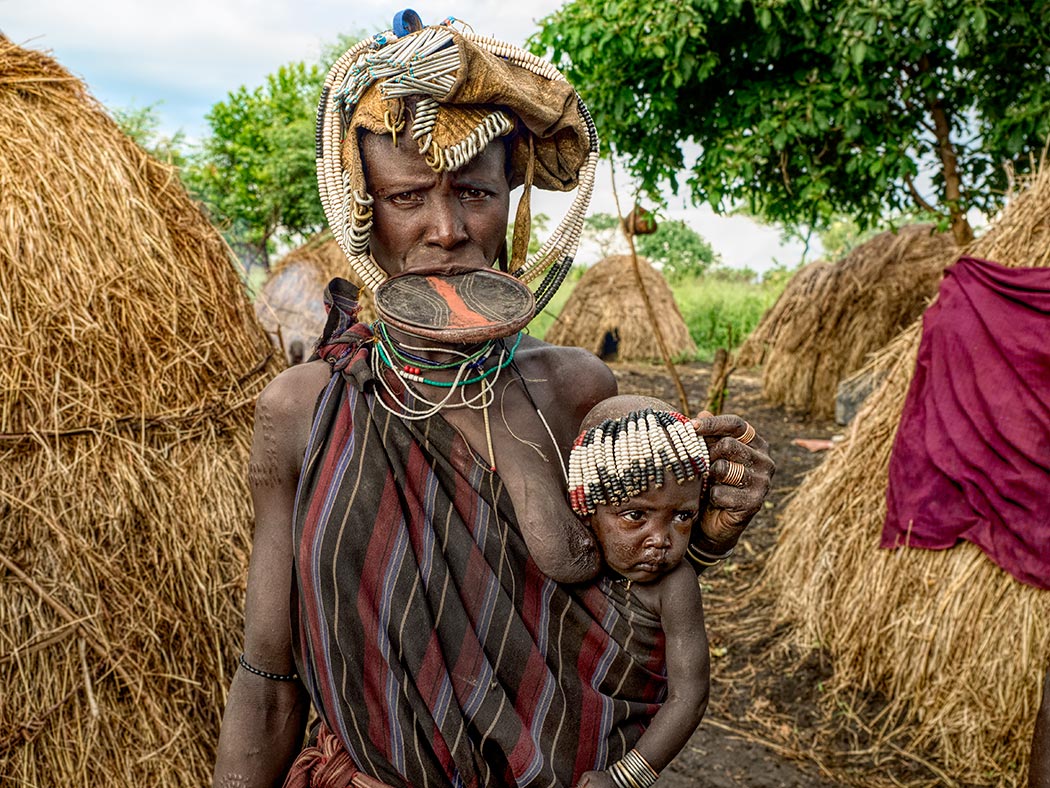The Mursi people are among the least developed of the 56 indigenous tribes that inhabit the southern Omo Valley in Ethiopia. I visited this tribe during a day trip into the remote Mago National Park. Thick, black mud sucked at my shoes as I walked among chest-high straw huts scattered around a small clearing. There was no electricity, very little shade, and no sign of water. In fact, the Mursi exist mostly on meat, milk, and blood from their livestock. Several Mursi women followed me around, hoping to earn the five Ethiopian Birr they charge for the right to take a photo. I ultimately chose this Mursi woman with lip plate, who charged me 15 Birr, 10 for her and an extra five for her infant.
Mursi women begin wearing lip plates when they reach puberty. In a special ceremony, a girl’s lower lip is cut and a small wooden stick inserted. Her lip is then stretched out over a one-year period by inserting increasingly larger plates made of wood or ceramic. The larger the plate, the more attractive and thus more marriageable the woman is said to be. Although women are not forced to go through the ceremony or wear a lip plate, there is strong social pressure to do so. A girl who refuses to wear a lip plate is considered to be lazy and risks being beaten by her mother, sister, and subsequent husband. A Mursi woman with lip plate is more likely to be unmarried or a newlywed. The longer a woman is married, the less she will wear it, and if her husband dies, the woman will remove the lip plate and never wear it again.


Could anyone survive without water? lol
Barbara, I urge you to be cognizant of the attitude and rhetoric you adopt when speaking of the Mursi people, any of the “least developed” people in “miserable living conditions.” This tribe has been around for much longer than the developed world, and for us to belittle their way of life or depict them to be greedy for money is perfectly insensitive. Your photo serves as many Westerners’ first account of the tribe, and in that way you hold a lot of power. Although I admire your photo, your language makes me uncomfortable, to say the least. I have linked an article describing the Mursi people in a more objective, informative way: http://www.mursi.org/introducing-the-mursi/history
Hi Zakiya: I appreciated your thoughtful comment and have taken to heart what you said. I believe you are correct about some of the language I used, thus I have removed my comment about the “miserable living conditions.” This description, obviously, reflected my view of what would constitute a miserable way of life, but I do understand that the Mursi would probably not think of their way of life as being miserable. It was insensitive of me. I have also changed the language around what the woman in the photograph charged me to pose in order to make it sound less mercenary. Thank you for the link where people can learn more about the Mursi tribe, and for taking the time to call my attention to this issue.
In my experience in Africa village women age rapidly. It is a harsh life for women. Most men are indolent, lazy and careless of family responsibilities. Cows and alcohol when available, are the first order of business.
Hi Neil: From what I observed, and the little I was able to glean from our guide, I suspect you are spot on.
That is there way of life…it is not the American way…with its own disturbances, bias and hatred. This lifestyle works for them. Focus on your own lifestyle.
Insane! very, very fascinating!
I could hardly wrap my brain around it, Rebecca.
What is her name? What is her story? What is the name of her young baby?
I have no idea Jordana. The Mursi are not particularly friendly. In fact, they seem suspicious of strangers and I felt they only tolerated us for the fees they charge for photos. Other than posing for photos, they wanted little to do with us.
They are not friendly to you, because they don’t trust you and you are only a tourist. Be glad you were able to purchase the photo and see how they live. Be grateful.
Saada, what makes you think I was not grateful? If anything, I felt sad for how difficult their life was, not critical.
So… I wonder… is the woman above newlywed? She doesn’t look especially young.
Hi Trina: I don’t speak her language, and neither did our guide or the armed guard that was required to accompany us, so there was no way to get details like that. However I was aware that all the women looked very worn – it’s a tough life they live. As such, I suspect she was relatively young.
Fascinating, BARBARA. A wonderful story and great photo. Sounds like an educational as well as interesting visit
Hi Margie: It was truly amazing! But also totally exhausting. Ethiopia is not easy travel, but it’s very rewarding. Glad you enjoyed my photo. I think it’s one of the best I’ve ever taken.